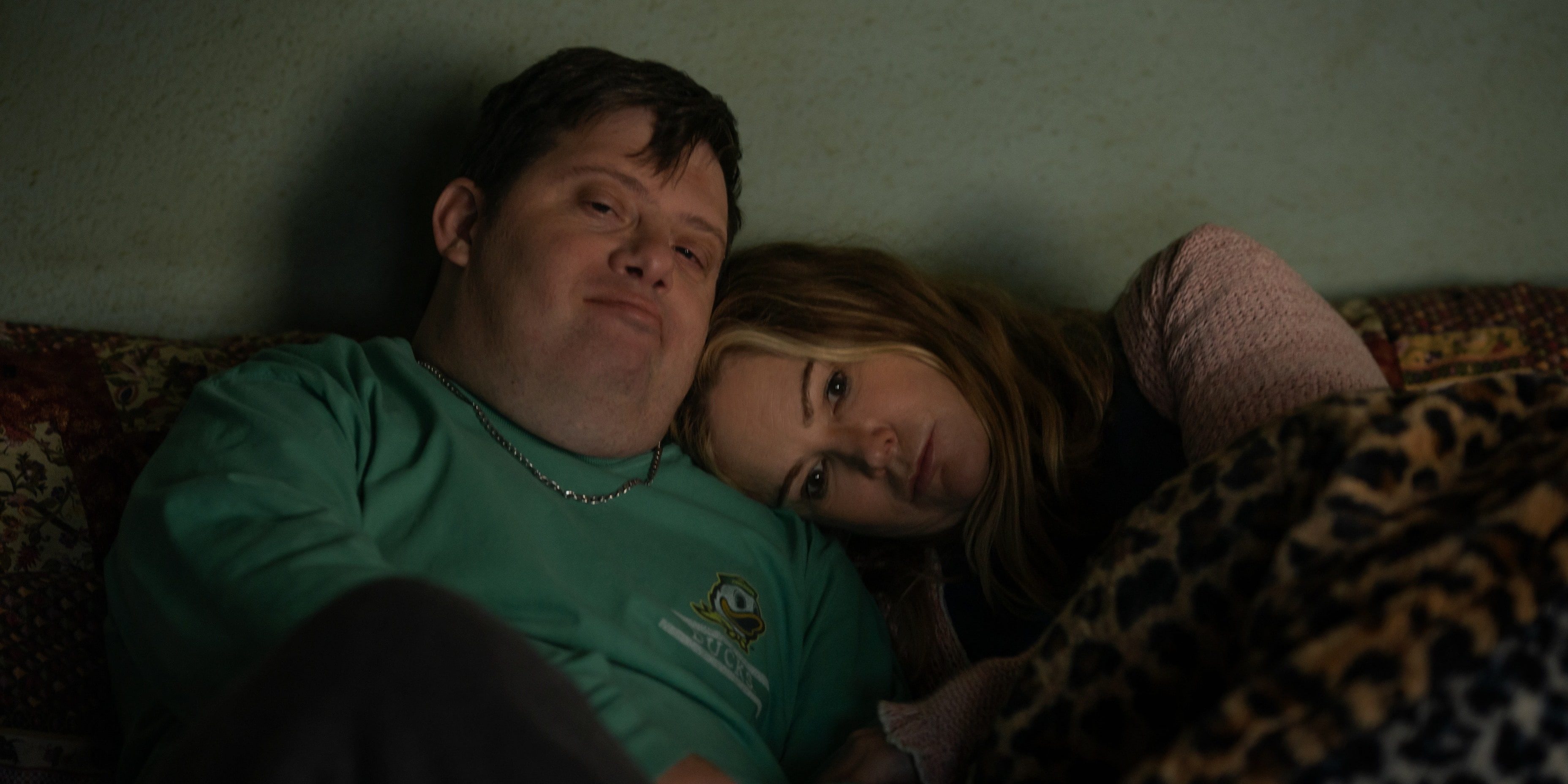Helmed by Benjamin Caron, Netflix’s ‘Night Always Comes’ follows its protagonist, Lynette, over the course of a single horrifying night. When her homeowner gives her one final deadline to deposit the money needed to secure her stay, the protagonist realizes that she will have to bend the rules in order to get what she wants. It is not just her own future at risk; it is also her brother, Kenny, who has Down syndrome, as well as her mother, Doreen. This suffocating journey takes her through many junctures, some old and some new, and each comes with its own set of trials and tribulations. Lynette has to make increasingly daring choices in the desperate attempt to fight a life of poverty and helplessness, even if the cost is to confront her traumatic past headfirst. In the end, the spiral into madness ultimately gives way to the character’s metamorphosis. SPOILERS AHEAD.
Night Always Comes Plot Synopsis
The story begins when Lynette is supposed to make the down payment for her house, where she lives with her mother and her older brother, who has a developmental disability. Although her mother, Doreen, promises to be there for the meeting at noon, she skips to instead use all that money to purchase a new car. The homeowner, David, gives Lynette an ultimatum: bring him $25,000 by 9 a.m. the next morning, or the house goes to someone else. This kickstarts Lynette’s late-night odyssey, which begins with Scott, a wealthy, married man who pays her to have sex with him. When she requests the money, he checks out of their dynamic entirely. Refusing to give up, Lynette steals his expensive car and parks it in a secluded area, hoping to sell it off to someone.

With a thousand dollars in her hands, Lynette reaches out to her old friend Gloria, a former sex worker who currently lives in a swanky apartment with her rich partner. Lynette once bailed her out of jail with $3,000, but when she asks for her money back, Gloria gets defensive. On the protagonist’s further insistence, her friend frantically pulls out $500 from her partner’s safe. Although this is not nearly enough, Lynette has the idea to break open the safe and steal money from it. She asks her co-worker, Cody, for help, given his background as an ex-convict. He suggests that they should take the safe out and head to a safecracker named Drew. However, when it is broken open and cocaine comes out, Drew and his partner get defensive and threaten Lynette, leading her to realise that she has made a mistake. But there is no going back now.
Night Always Comes Ending: Does Lynette Get the Money? Does She Get the House Back?
Lynette begins with $1000 from Scott, and once the situation with Drew gets violent, she throws whatever contents of the safe she can in a bag and escapes the place with Cody. That gives her $19,000 and a packet of cocaine. Still $4,000 short, Lynette relays her problems to Cody, who promises to get the rest of the money to her in return for the keys to Scott’s cars. After picking up Kenny from his care facility, the protagonist shows the car to Cody, but he immediately changes his tune and snatches the entirety of the money out of her hands. Enraged, Lynette takes a drastic step and hits him with her car, before retrieving her money and heading to Tommy, a drug dealer.

Cody explains that he cannot bring up the sum Lynette needs at this hour of the night, but points her to a rich client named Blake, who is hosting a drug party. There, Lynette runs into yet another problem, as Blake makes sexual advances towards her in return for the cash. However, she breaks free of his clutches and escapes the house with her brother. With the full $25,000 at hand, Lynette breathes a sigh of relief, hoping that her mother will help her recover the house, but more surprises await. Doreen refuses to come for the signing and makes it clear that she never intended to buy the house. Her impulsive purchase of a car, as such, gets recontextualized as her way to stall the process. Things go from bad to worse when David, the homeowner, leaves a voice message announcing that the house has already been sold to someone else, sealing the fate of Lynette’s family.
What makes the situation particularly complex is that, in selling the house away, David backs out of his end of the deal of waiting till 9 a.m. before making his move. Although Lynette cuts off his voicemail explaining why he did this, we can make out the fact that he simply got tired of the delays and gave in to the sweeter deal. The fact that David relays this message via a voicemail instead of a direct call can be interpreted as him refusing to be face-to-face with the protagonist out of shame. Instead, he puts the blame squarely back on the family for not stepping up to his demands. While there is truth to that statement, it still shows his insensitivity to the situation, adding to the overarching theme of the narrative about how the wealth gap can contort people’s psyches and subsequently alter how they act in trying circumstances.
Where does Lynette Go? What is in Her Letters?
‘Night Always Comes’ ends with Lynette taking control of her life in the face of all adversities. All appears lost when she gets a phone call from David announcing that he has sold the house to a higher bidder, but this matters less. Lynette realizes that the real hurdle was not collecting the $25,000, but her mother’s refusal to be in this house any longer. However, instead of letting things weigh her down any further, Lynette makes the difficult but liberating decision of leaving her home. Leaving two envelopes behind, one for the money she owes to Gloria and the other for her mother, Lynette bids her brother goodbye and heads out in her car. While her destination is never mentioned, it is clear that she is leaving her life in Portland behind and moving towards a more hopeful future.

While Lynette’s actions are defined by a number of complex factors, both physical and psychological, the most significant of these appears to be her mother’s words earlier that day. Doreen refuses to take any responsibility for her daughter’s abuse when she was sixteen, and instead labels it as a conscious decision on Lynette’s end. Furthermore, she rebukes her daughter for seemingly leaving the family behind and explains how she was doing just fine with Kenny until Lynette returned. Although scathing, the exchange confirms two things for the protagonist. Firstly, it makes her realize that she will never be truly accepted as a part of the family, and secondly, it reiterates the idea that Doreen is capable of sustaining her son. With this, Lynette asserts her agency by reclaiming her mother’s perception of her in a new light.
Lynette’s Decision Brings Her Arc Full Circle
Tommy and his clients are not the only contributors to Lynette’s sexual abuse, as her mother’s apathy towards her circumstances also plays a part. This continues even to the present day, when the protagonist finally confronts Doreen about her absence in times of need. Instead of admitting to her mistakes, Doreen frames the situation as Lynette running out of the house on her own volition and failing to find the right lover. She goes a step further, skipping to calling her daughter a grown woman and thus responsible for what befalls her. This points to her complete disinterest in being accountable, and Lynette soon realizes that their exchange will go nowhere. Her final act, as such, is also a rebellion against her mother’s false perception of things, not by correcting it, but by moving past it.

At sixteen, Lynette was a victim when she left the house. In the present, however, Lynette has come to terms with who she is and voluntarily leaves the house, mirroring the past but also taking control over it, and this is what she writes in the letter for her mother and brother. She describes this renewed sense of courage as her ability to fight, and with that, she sets out to carve out a new path for herself. The visual symbolism of the narrative also supports this, as Lynette’s journey towards freedom takes place with the warm sun shining upon her. This is in stark contrast to the bulk of the movie, which takes place at night and forces her to take on the criminal underbelly of the city. Her return from Blake’s house features an extended shot of her face, with neon shades of the night reflecting her anxious, traumatized visage. By the morning, that expression is replaced by a smile and a glint in her eyes, indicating that the next chapter in her life will likely be a good one.
What Happens to Kenny and Doreen? Why Didn’t Doreen Want to Buy the House?
While Lynette moves on to the next stage in her life, Doreen and Kenny are also set on a new course, albeit with no clear direction in sight. Given that David has already sold the house, it is a matter of time before the mother and son duo are evicted. However, with the house out of the way, it is possible that Doreen will return the car and use that money to look for a new place to stay. Her original purchase was merely a means to prove a point, and now it is likely that she will use the money more sensibly for the care of her son. There is also the money that Lynette has left behind in an envelope, which can help sustain the duo for a few more days, during which Doreen can look for better job prospects and hopefully continue Kenny’s education. Thus, while their path forward is perilous, the two might pull through.

Although being forced to start from scratch can seem like a wholly negative setback, for Doreen in particular, there is also some joy in this development. During her conversation with Lynette, she reveals that she bears a deep hatred for the house, as did her husband. This feeling is the chief reason for her refusal to participate in the down payment process, and now that the house is no longer theirs, she likely feels a sense of liberation. However, at the same time, she no longer has anyone to blame for her own misgivings, which will likely force her to become a more responsible parent. Lynette’s relationship with Kenny continues to be a warm one, and while she promises to miss him every second, she also realizes that she must live for herself as well. Here, Gloria’s comment about the protagonist acting too much like Kenny’s mother comes back, and she learns from it by trusting her mother to take care of the family.
Read More: Is Netflix’s My Oxford Year Based on a True Story?


You must be logged in to post a comment.